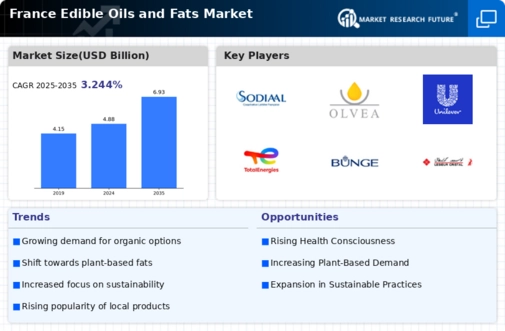Rising Demand for Plant-Based Oils
The edible oils market in France experiences a notable increase in demand for plant-based oils, driven by a shift towards healthier dietary choices. Consumers are increasingly opting for oils such as olive, sunflower, and canola, which are perceived as healthier alternatives to animal fats. This trend is reflected in market data, indicating that plant-based oils account for approximately 70% of the total edible oils consumption in France. The growing awareness of the health benefits associated with these oils, including lower saturated fat content and higher levels of unsaturated fats, further propels this demand. As a result, manufacturers are adapting their product lines to cater to this preference, thereby influencing the overall dynamics of the edible oils-fats market.
Increased Focus on Sustainable Sourcing
Sustainability is becoming a pivotal concern for consumers in France, influencing their purchasing decisions in the edible oils-fats market. There is a growing expectation for products that are sourced responsibly, with an emphasis on environmentally friendly practices. This trend is prompting manufacturers to adopt sustainable sourcing methods, such as using organic farming practices and ensuring fair trade conditions. Market data indicates that products labeled as sustainably sourced have seen a 25% increase in sales, reflecting consumer willingness to pay a premium for such oils. As sustainability continues to gain importance, it is likely to reshape the supply chain dynamics within the edible oils-fats market, encouraging more brands to commit to ethical sourcing.
Innovation in Food Processing Techniques
Advancements in food processing technologies significantly impact the edible oils-fats market in France. Innovations such as cold-press extraction and refining processes enhance the quality and nutritional profile of oils, making them more appealing to health-conscious consumers. These technologies not only improve the flavor and aroma of oils but also preserve essential nutrients, which is increasingly important in a market where consumers are more discerning about food quality. Market data suggests that the adoption of these innovative techniques has led to a 15% increase in the production of high-quality oils over the past year. Consequently, this trend is likely to continue shaping the competitive landscape of the edible oils-fats market.
Regulatory Support for Healthier Products
The French government actively promotes healthier eating habits, which has a direct influence on the edible oils-fats market. Regulatory initiatives aimed at reducing trans fats and promoting the use of healthier oils are becoming more prevalent. For instance, recent policies encourage the use of oils with lower saturated fat content, aligning with public health objectives. This regulatory support is likely to drive manufacturers to reformulate their products, thereby increasing the availability of healthier options in the market. As a result, the edible oils-fats market is expected to witness a shift towards oils that comply with these regulations, potentially leading to a 10% growth in the segment of health-oriented oils.
Culinary Trends Favoring Diverse Oil Usage
Culinary trends in France are evolving, with chefs and home cooks alike experimenting with a variety of oils to enhance flavors in their dishes. The growing popularity of international cuisines introduces consumers to diverse oils, such as sesame and avocado oil, which are gaining traction in the edible oils-fats market. This trend is reflected in market data, indicating a 20% increase in the sales of specialty oils over the past year. As culinary creativity flourishes, the demand for unique and high-quality oils is likely to rise, prompting manufacturers to expand their offerings. This diversification in oil usage is expected to play a crucial role in shaping consumer preferences within the edible oils-fats market.






















Leave a Comment